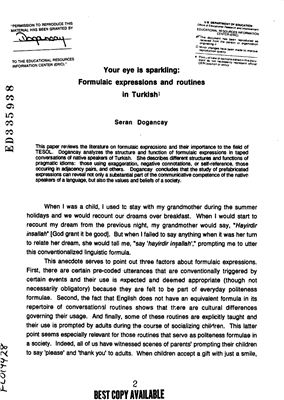Washington, D.C.: 1990. 17 p.
There are certain pre-coded (formulaic) utterances conventionally triggered by certain communication situations, and their use is expected and deemed appropriate because they are seen as part of everyday politeness formulas. Lack of an English equivalent indicates cultural differences goveing their use. Some routines are taught explicitly and their use is prompted by adults in socializing children. These expressions are part of every competent speaker's repertoire, and include proverbs, idioms, greetings, apologies, thanks, and leave-taking. Turkish is rich in formulaic expressions, both spoken and written, evidenced in proverbs, idioms, and one-word formulas serving different functions in different contexts. A study investigated the structure and function of such routines in Turkish in naturally-occurring and filmed conversations of a variety of individuals. Subjects were equal numbers of males and females aged 30-
55. Only two of the formulaic expressions identified were proverbs; the remainder were pragmatic idioms. Analysis indicates that the expressions were used as politeness devices, helping the conversation progress smoothly. It is concluded that the study of prefabricated, routinized expressions can reveal both a substantial part of the native speaker's communicative competence and the values and beliefs of the society. A 31-item bibliography is included.
There are certain pre-coded (formulaic) utterances conventionally triggered by certain communication situations, and their use is expected and deemed appropriate because they are seen as part of everyday politeness formulas. Lack of an English equivalent indicates cultural differences goveing their use. Some routines are taught explicitly and their use is prompted by adults in socializing children. These expressions are part of every competent speaker's repertoire, and include proverbs, idioms, greetings, apologies, thanks, and leave-taking. Turkish is rich in formulaic expressions, both spoken and written, evidenced in proverbs, idioms, and one-word formulas serving different functions in different contexts. A study investigated the structure and function of such routines in Turkish in naturally-occurring and filmed conversations of a variety of individuals. Subjects were equal numbers of males and females aged 30-
55. Only two of the formulaic expressions identified were proverbs; the remainder were pragmatic idioms. Analysis indicates that the expressions were used as politeness devices, helping the conversation progress smoothly. It is concluded that the study of prefabricated, routinized expressions can reveal both a substantial part of the native speaker's communicative competence and the values and beliefs of the society. A 31-item bibliography is included.

